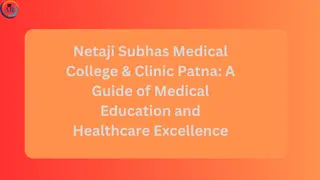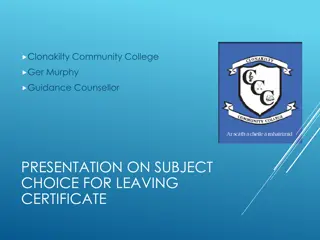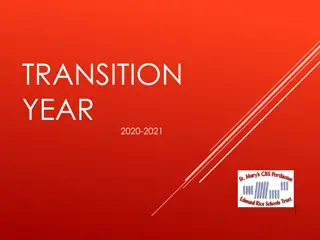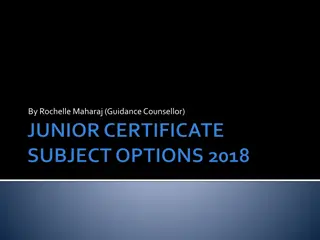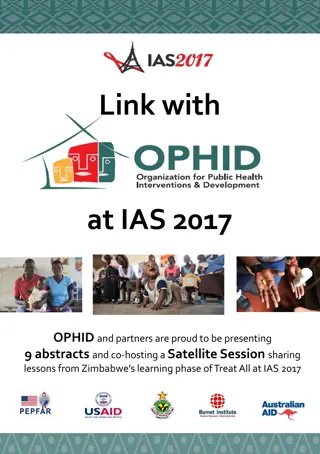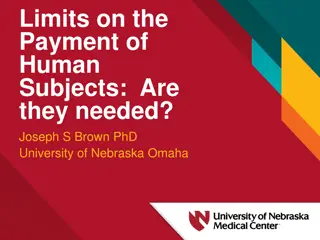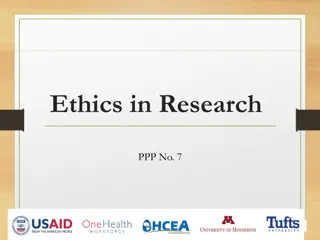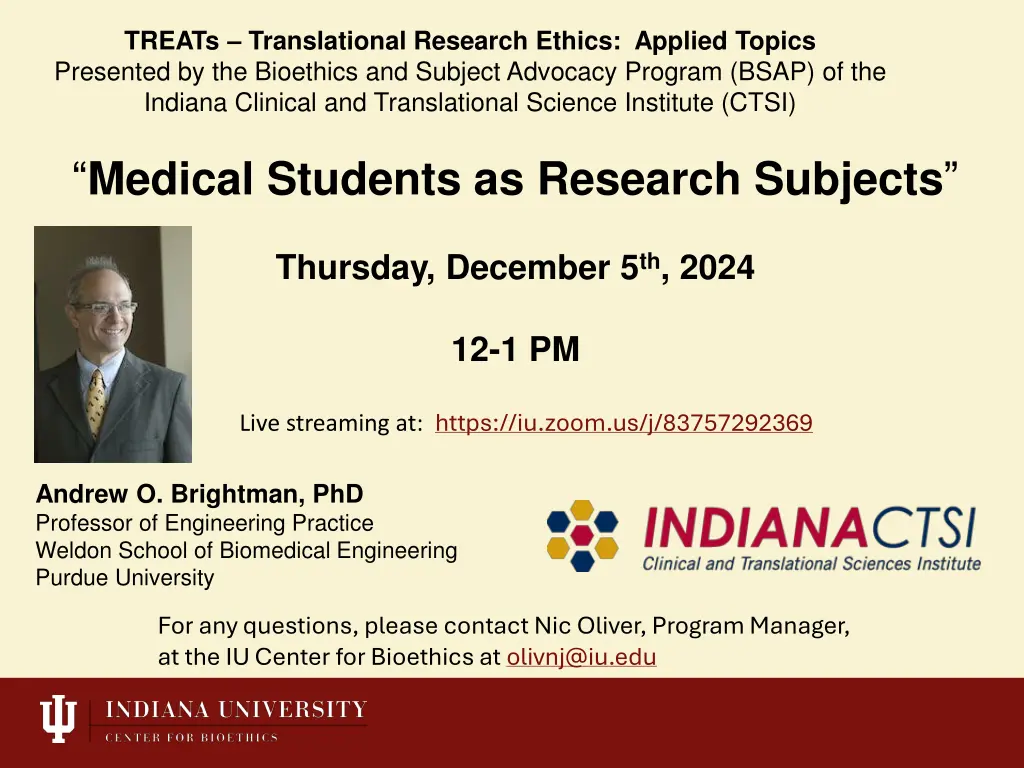
Ethical Considerations in Medical Student Research Participation
Explore the ethical implications of involving medical students in research studies, including their perceptions, responses to evaluation and research requests, and special considerations as human subjects. Gain insights from a study on medical student perspectives and suggestions for practice. Join the live event on December 5th, 2024, led by experts in bioethics and biomedical engineering.
Download Presentation

Please find below an Image/Link to download the presentation.
The content on the website is provided AS IS for your information and personal use only. It may not be sold, licensed, or shared on other websites without obtaining consent from the author. If you encounter any issues during the download, it is possible that the publisher has removed the file from their server.
You are allowed to download the files provided on this website for personal or commercial use, subject to the condition that they are used lawfully. All files are the property of their respective owners.
The content on the website is provided AS IS for your information and personal use only. It may not be sold, licensed, or shared on other websites without obtaining consent from the author.
E N D
Presentation Transcript
TREATs Translational Research Ethics: Applied Topics Presented by the Bioethics and Subject Advocacy Program (BSAP) of the Indiana Clinical and Translational Science Institute (CTSI) Medical Students as Research Subjects Thursday, December 5th, 2024 12-1 PM Live streaming at: https://iu.zoom.us/j/83757292369 Andrew O. Brightman, PhD Professor of Engineering Practice Weldon School of Biomedical Engineering Purdue University For any questions, please contact Nic Oliver, Program Manager, at the IU Center for Bioethics at olivnj@iu.edu
Medical Students as Research Subjects Agenda: A Study of Medical Students as Research Subjects Special Considerations for Medical Students Ethics Guidance Q & A
Medical Students as Research Subjects Tater et al. 2024 - A study of evaluation and research requests to medical students in New Zealand: Two pre-clinical student cohorts were surveyed (aggregated response rate 28%, n=167) In one year, they received 42 and 34 evaluation requests And 8 and 10 research requests, respectively. 70% felt they received too many evaluation requests 76% indicated program evaluation request volume should be limited, and 30% indicated receiving program evaluation requests was a little stressful Tater, J., Zaharic, T., Guy, W., & Cornwall, J. (2024). How much is too much? Medical students perceptions of evaluation and research requests, and suggestions for practice. Assessment & Evaluation in Higher Education, 49(1), 117-128.
Medical Students as Research Subjects Perceptions of Evaluation VS. Research Requests: Students viewed research requests differently to evaluation requests They were more likely to engage with research (44%) than evaluation requests (27%) 23% stated they had no real interest in engaging with evaluation compared to 6% for research requests Students felt they received too many evaluation requests (70%) compared to too many research requests (12%) Students were more likely to rate their first reaction to receiving an evaluation request as stressful (31%) compared to when research requests were received (20%)
Medical Students as Research Subjects Special Considerations for Medical Students: Students are an accessible Human Subjects Research population Students need to be considered a vulnerable HSR population Students can benefit, and benefit from, participation in research
Medical Students as Research Subjects Medical Students as a Vulnerable Population: In Beyond Consent, Seeking Justice in Research, the authors ponder the many challenges of vulnerable populations as research subjects: Clinical research is a complex, expensive, and valued social activity A subject population that is convenient, both in terms of recruitment availability and monitoring through the course of the study makes clinical research more feasible Medical students seem to occupy a middle ground between short- term hospitalized patients and long-term prisoners Among the ways that students differ from general population is their availability, the greater likelihood that they can be coerced or manipulated into participation by virtue of their dependent status Moreno, J.D., Convenient and Captive Populations, (1998) in Beyond Consent, Seeking Justice in Research, (Jeffrey P. Kahn et al. Ed.) Oxford University Press, p. 111. Page 17 in Human Subject in Research U. Mass, Amherst
Medical Students as Research Subjects Medical Students as a Vulnerable Population: Medical students have described a sense of professional responsibility to participate in research (Devine et al. 2019) Because medical students understand the importance of research, they are often willing to participate in surveys and other research studies with no more than minimal risk However, because they are first and foremost students, it is important to protect their role and priorities as learners To ensure students can prioritize time for coursework, a few medical schools require additional review by the Associate Dean of Medical Education for protocols seeking to recruit medical students as participants. (Boonshoft School of Medicine)
Medical Students as Research Subjects Medical students can benefit from HSR participation: Benefit their understanding of HSR generally its challenges and its role in improving medicine Benefit their own education and can improve future medical training (Stephenson et al., 2019) Benefit their specific understanding of distinctions of clinical / biomedical / educational research Benefit their potential future research involvement or support as they progress professionally
Medical Students as Research Subjects Potential Positive and Negative Impact on Studies: Medical education and training may increase the student s understanding of risk and consent Medical education may increase the student s compliance with research protocols Participation fatigue may reduce the student s compliance or increase drop-out from studies
Medical Students as Research Subjects Question: Do medical students need additional (special) protections? (Christakis,1985 Harvard Medical School) Some early requirements were so restrictive so as to prevent most studies from using students Typically required double review by both medical school and study site hospital IRB All students received policy statement at the beginning of each year as to participation Student health and well-being were considered as priorities along with time constraints Payment for participation was restricted due to the large debt of most medical students
Medical Students as Research Subjects Question: Some changes proposed to the special protections (Christakis,1985 Harvard Medical School) Changes seek to eliminate the perceived paternalistic attitude of the policies Changes seek to eliminate the double (standard) review of protocols Treat medical students as responsible autonomous adults and utilize the same standards for review as with all adult populations
Medical Students as Research Subjects Ethics Guidance: IUSM Guidance (May 2024) 1. Recruitment of students into a study by their instructor has the potential to be coercive. For this reason, teachers should not use their own students as subjects in their research if it can be avoided. 2. When researchers do wish to enroll their own students in research and the participation involves students completing extra-curricular activities, the researcher is required to obtain permission from their students, and additional steps should be taken to prevent the students from feeling coerced into participating.
Medical Students as Research Subjects Ethics Guidance: IUSM Guidance (May 2024) 3. The researcher should arrange to have the permissions and data collected in such a way that they will not know which students are participating and will not have access to data that indicates participation, until the final grades have been entered. 4. If some course credit is offered in exchange for participation, an alternate means of earning equivalent credit for an equivalent commitment of time and effort should be made available to all potential student subjects. These alternatives must be carefully reviewed to make sure that students are not being coerced into becoming subjects.
Medical Students as Research Subjects Ethics Guidance: Are these protections sufficient for medical students to participate in research?
Ethics Guidance - Other Institutions: Univ. of Pittsburgh 1. Given the heavy curriculum burden on medical students, the School of Medicine has developed a specific policy for their enrollment into research protocols. 2. A proposed research plan must be must reviewed by the Research on Medical Students (ROMS) Review Committee before it can be submitted to the IRB. 3. The goal of this additional review is to balance the needs of researchers with the interests and availability of the medical students. 4. A medical student may not be required to participate in research for course credit. For optional course or extra credit, in all cases, a comparable non-research alternative must be offered.
Ethics Guidance - Other Institutions: Univ. of Pittsburgh 5. To minimize the potential for coercion, alternatives to participating in research must be comparable in terms of time, effort, and fulfillment of requirements. 6. All students must be free to withdraw from participation at any point in a study without penalty. Students who withdraw must receive full credit for participation. 7. Recruitment must be designed to minimize the possibility of undue influence. Potential participants should be solicited from a broad base of individuals meeting the conditions for study, rather than by personal solicitation of specific students. 8. Except in unusual circumstances, investigators should not enroll students from their own classes when the research involves greater than minimal risk without the prospect of direct benefit.
Medical Students as Research Subjects Ethics Guidance: 12 Basic Recommendations (Boileau, E., Patenaude, J., & St-Onge, C. (2018). Twelve tips to avoid ethical pitfalls when recruiting students as subjects in medical education research. Medical Teacher, 40(1), 20-25.) 1.Determine if the study is evaluation or research based on intended use and audience for findings 2. Verify need for consent for secondary use of data typically based on level of identifiable information 3. Inform students of all privacy and consent measures to reduce potential for coercion or biased responses 4. Obtain consent by an independent team member - to reduce COI and coercion in recruitment & consent
Medical Students as Research Subjects Ethics Guidance: 12 Basic Recommendations (Boileau, E., Patenaude, J., & St-Onge, C. (2018). Twelve tips to avoid ethical pitfalls when recruiting students as subjects in medical education research. Medical Teacher, 40(1), 20-25.) 5.Ensure participation remains confidential throughout esp. as cohort size decreases and stakes increase 6.Limit personal data collection and anonymize data or de-identify information before release to faculty 7.Protect again any possible re-identification of data esp. with small cohorts and strict inclusion criteria 8.Protect again any possible unauthorized data access - esp. secure digital data, to ensure trust in research
Medical Students as Research Subjects Ethics Guidance: 12 Basic Recommendations (Boileau, E., Patenaude, J., & St-Onge, C. (2018). Twelve tips to avoid ethical pitfalls when recruiting students as subjects in medical education research. Medical Teacher, 40(1), 20-25.) 9. Avoid making study part of mandatory training avoids full consent and may prove harmful to some 10. Consider using breaks in mandatory training decreases stress and increased participation 11. Avoid offering course credit for participation complicates consent, coercion, and selection bias 12. Seek review by an education research committee - such committees are rare, but can supplement IRB
Medical Students as Research Subjects Q & A: Special Considerations for Medical Students as Research Participants, yes, no, maybe?
References: 1. Christakis, N. (1985). Do medical student research subjects need special protection?. IRB: Ethics & Human Research, 7(3), 1-4. 2. Sarpel, U., Hopkins, M., More, F., Yavner, S., Pusic, M., Nick, M., ... & Kalet, A. (2013). Medical students as human subjects in educational research. Medical Education Online, 18(1), 19524. 3. Hally, E., & Walsh, K. (2016). Research ethics and medical education. Medical teacher, 38(1), 105-106. 4. Boileau, E., Patenaude, J., & St-Onge, C. (2018). Twelve tips to avoid ethical pitfalls when recruiting students as subjects in medical education research. Medical Teacher, 40(1), 20-25. 5. Stephenson, E. D., Farquhar, D. R., Masood, M. M., ... & Zanation, A. M. (2019). Blinded evaluation of endoscopic skill and instructability after implementation of an endoscopic simulation experience. American Journal of Rhinology & Allergy, 33(6), 681-690. 6. Devine, L., S. Ginsburg, T. Stenfors, & L. Stroud (2019). Professional Responsibilities and Personal impacts: Residents Experiences as Participants in Education Research. Academic Medicine: Journal of the Association of American Medical Colleges, 94 (1): 115 121 7. Awad, M. M., Kaji, A. H., & Pawlik, T. M. (2024). Practical Guide to Ethics in Surgical Education Research. JAMA surgery. 8. Tater, J., Zaharic, T., Guy, W., & Cornwall, J. (2024). How much is too much? Medical students perceptions of evaluation and research requests, and suggestions for practice. Assessment & Evaluation in Higher Education, 49(1), 117-128.
Advice and Consulting on Ethics Considerations for Translational Research Center for Bioethics - Bioethics and Subject Advocacy Program (BSAP) - https://bioethics.iu.edu/ethics-research/request-consult.html - Contact: Nic Oliver, Program Manager at olivnj@iu.edu Indiana CTSI - Think Tank (Medical Technologies) - https://indianactsi.org/researchers/services-tools/think-tank/ - Contact: Dr. Kara Garcia, Navigator at karagarc@iu.edu


